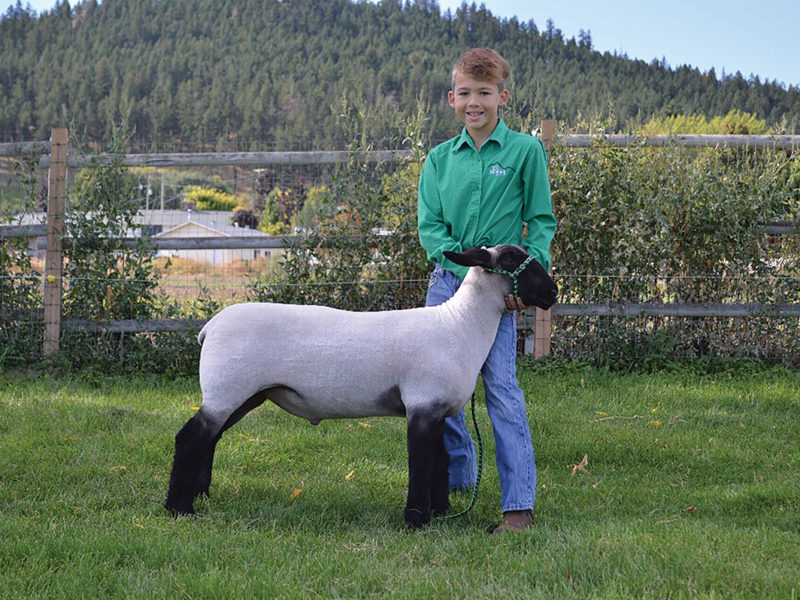BARRIERE – The 4-H community continued to demonstrate its resiliency with a much different show and sale at the BC Ag Expo in Barriere, September 25-28.
With pandemic restrictions still in place, organizers put together a virtual show and sale for 4-H and open youth.
“When we made our decision to go virtually, we really wanted to deliver an
in-person fair but with the numbers that we have, it just wasn’t feasible. We couldn’t wrap our heads around the size restrictions,” says BC Ag Expo Society president Evelyn Pilatzke.
Organizers quickly adapted a recently purchased software package from an in-person fair to a virtual format, with the volunteer members learning the ropes as plans progressed.
Over 125 youth from the Cariboo, Shuswap, Okanagan, Boundary and Thompson Nicola Regional District participated in the 4-H and open categories. The fair typically has about 300 youth entrants plus adults.
The youth competed in classes for beef, cavy, goat, lamb, photography, rabbits, carcass and educational display, plus the Fred Nicol, Twemlow and Boundary Dash events.
Participants provided front, side and rear photos of their entries plus a 30-second video of their animal walking.
The online auction showcased the various classes, champions and auction items including beef, lamb, photographs, a chevon goat and a rabbit.
Fewer youth took part in the three-day auction but active bidding at the end resulted in decent prices for all participants.
“It was a different concept than an in-person auction for us,” says Pilatzke. “It was a nail-biter right up to the end.”
Over 70 bidders signed in over 52 hours. The average price for market steers was $3.09 a pound, $5.98 a pound for carcass steers, $583 a head for market lambs, $512 a head for carcass lambs and $176 each for photographs.
South Thompson 4-H Club member Conor Brown entered in the beef and sheep classes this year to raise money for university.
He is grateful for the community support that enabled the show and sale to take place despite the pandemic but missed the in-person aspect of a traditional fair.
“It was a heartbreaker not to be able to show. That’s our grand finale,” he says. “The show means so much; it’s the time we get to show all our work. We work our beef for almost a year and the sheep for about six months. Plus the social part of the fair is gone, where you see old friends, kids you grew up with in 4-H.”
Tod Mountain 4-H Club member Hailee Lamb was disappointed that COVID-19 limited opportunities to show her steer and heifer projects this year. But the 16-year-old was impressed by her sale prices at the online auction and vows to continue with 4-H next year.
Stepping up
BC 4-H manager Aleda Welch says clubs have stepped up this year to provide their members with some regular events during such an unusual year.
“It’s fabulous that a lot of these fairs and third-party organizers were able to arrange for virtual auctions, shows and sales so that our members could complete their project year,” she says. “At the end of the year, a lot of clubs and districts were actually able to have their in-person achievements in a modified version. It wasn’t what they were used to in the past but the feedback was that they were very appreciative that the leaders rallied behind them and were able to have a little bit of normalcy for the end of the year.”
BC 4-H also adapted, changing its annual five-day Food for Thought event involving 45 youth to six
one-day events in different locations across BC where group restrictions could be met.
“It all worked out extremely well. We got some great feedback from the kids; they were very happy to have gotten out at least for that one day and participate in the 4-H program,” Welch says about the event.
BC 4-H and 4-H groups across BC are now looking forward to an uncertain future with great hopes that things return to normal.
“As for next year, we’re hoping for the best. We’re currently planning for
in-person programming with the hope that we’ll be able to do the programs as we have been able to in the past where the members can get together and do the programs as a group,” notes Welch.
But with virtual 4-H events behind most large agricultural fairs in BC, everyone also feels prepared for a repeat of this year.
“If worst comes to worst, we’re certainly ready to put on another virtual fair. We’re hoping, though, it’s going to be an in-person fair. The kids really miss seeing all their friends and doing it as an in-person fair,” says Pilatzke.


 High confidence, high prices
High confidence, high prices